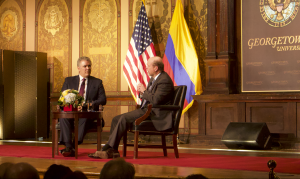As a member of the vibrant Georgetown University community, I have always taken pride in our institution’s rich tradition of fostering a holistic environment conducive to intellectual growth and moral development. Our ethos, rooted in the timeless Jesuit values of respect for individual dignity and the relentless pursuit of truth, has always been the cornerstone of our educational model. However, a recent red rating on the Foundation for Individual Rights and Expression (FIRE)’s Free Speech Rankings has cast a shadow on our commitment to open discourse, an essential component of our collective ethos.
It was our Code of Student Conduct that received the poor rating from FIRE, particularly the section on incivility, which, despite its well-intentioned aim to maintain a respectful and tolerant campus environment, has inadvertently stifled the free exchange of ideas. There are a host of ways we could fix this, but simply revising the Code of Student Conduct would be a great place to start, as it forms the foundational framework for campus interactions and policies, directly influencing the everyday experiences of our students and staff.
Currently, the Code of Student Conduct defines incivility as “engaging in behavior, either through language or actions, which disrespects another individual.”
This begs the question: What constitutes disrespectful behavior?
The absence of a clear definition of ‘disrespectful behavior’ in the policy raises concerns. The article fails to establish a direct connection between the policy’s ambiguity and the experiences of conservative-leaning individuals in environments where their views are in the minority. Free speech permits individuals, whether students or faculty, to express disagreement, even if it’s vigorous or passionate. Georgetown’s speech and expression policy, which received a favorable rating on the linked site, explicitly supports this. In practice, this policy has protected a wide range of speech, from far-left to far-right and everything in between.
A more nuanced and specific definition of “disrespectful behavior” in the Code of Student Conduct is imperative to safeguard the delicate balance between the free expression of ideas and maintaining a respectful, inclusive campus environment. Such a definition should explicitly include behaviors such as hate speech, blatant discriminatory or racist language, and the distribution of harmful propaganda. For instance, the recent distribution of antisemitic and racist pamphlets at Georgetown, attributed to an external organization but directly targeting the student community, underscores the urgency of addressing such misconduct. This incident, disturbingly close to the campus and affecting its members, demonstrates the need for clear, enforceable policies that protect students from targeted hate speech and intimidation, while still upholding the fundamental principle of free expression. Ensuring that the guidelines are clear, specific, and reflective of the community’s values is crucial to fostering a campus atmosphere where all members feel safe, respected, and valued.
However, we can do more than just revise the Code of Conduct. To address the vagueness of the Code of Conduct regarding disrespectful behavior, we must educate both faculty and students on the importance of engaging constructively with diverse perspectives. Workshops focusing on skills like active listening and respectful disagreement can deepen understanding and refine individual viewpoints. Interactive sessions, such as role-playing exercises on controversial topics, can help attendees practice navigating sensitive conversations with empathy and openness. Additionally, introducing more neutral ombudsmen or a free speech advocate on campus could ensure a balanced approach to free speech. This role would provide a safe and impartial channel for expressing concerns about potential infringements on free speech, helping to clarify and enforce respectful behavior standards in our campus community.
Fostering more viewpoint diversity through initiatives such as debates, speaker series, and encouraging cross-ideological dialogues among student organizations would also substantially enrich the inclusivity of our intellectual environment. The responsibility for this endeavor should be shared among the administration, faculty, and student body. The university’s administration could provide the necessary platforms and resources, faculty could integrate such dialogues into their curriculum, and the student body could actively participate and drive these discussions, creating a collaborative effort toward a more inclusive intellectual landscape.
Lastly, we need to establish open avenues of communication on this issue among the administration, faculty, and students. Initiating a continuous feedback loop—be it through scheduled forums, regular online surveys, or dedicated feedback committees—will guarantee a perpetual assessment of our campus ambiance, ensuring it resonates with our core values. Open channels of communication will be instrumental in nurturing a culture where the free exchange of ideas thrives, which is fundamental for fostering intellectual growth, creativity, and innovation. Such an environment not only enriches academic discourse but also prepares students to engage thoughtfully and effectively in diverse, real-world contexts.
This month, the Free To Choose Network released a docu-series on YouTube entitled Free To Speak that delves into the problem of limitations on free speech on college campuses. In one episode entitled “Thought Police,” Geoffrey Stone, a Professor of Law at the University of Chicago, said, “People need to be courageous, people need to be willing to ask questions, seek to learn, and seek to understand. One cannot have a robust and effective democracy without free speech.” He’s right. Engaging with diverse perspectives is essential to understanding and refining your own beliefs. And this is crucial because it fosters a culture of critical thinking and informed decision-making, which are the cornerstones of not only a thriving academic environment but also a healthy democratic society.
The red rating on FIRE’s Free Speech Rankings should serve as a catalyst for introspection and constructive action. By realigning our policies, investing in educational initiatives, and fostering a culture of open discourse, Georgetown University can uphold its longstanding tradition of intellectual rigor and moral development. Through these steps, we can ensure that our campus remains a haven for free thought and respectful dialogue, honoring the true spirit of a Georgetown education. I would “Hoya Saxa” to that!




